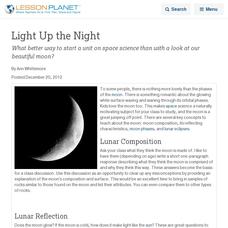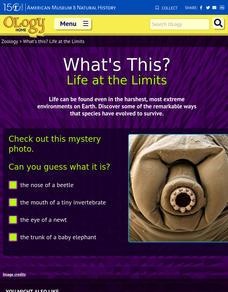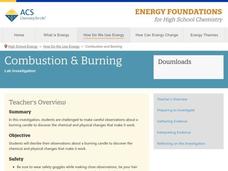Curated OER
Reading Comprehension: Thor and Sif
Expose your readers to the fascinating legends of Norse Gods Thor and Sif. They read a brief introduction about traditional stories and myths then read several paragraphs on these figures, marking unknown words as they go. Learners look...
Curated OER
Excite the Night with a Look at the Moon
What better way to start a unit on space science than with a look at our beautiful moon?
TLS Books
Neptune
Did you know that Neptune is named after the Roman god of the sea? Young astronomers read about this and other facts about the eighth planet from the sun in a short informational text passage.
It's About Time
The Sun and Its Effects on Your Community
Why is the sun round? Examine this question, and others, with your pupils while teaching them how to live in a more earth-friendly environment. Pupils explore Sun composition and discuss how solar wind, sunspots, and solar energy affects...
Curated OER
Figurative Language Quiz
Combining questions about figurative language and Sandra Cisneros's The House on Mango Street, this quiz would be a good addition to your class. The majority contains questions about simile, metaphor, and personification, from...
American Museum of Natural History
What's This? Life at the Limits
There are some amazing ways species evolve to survive. From large ears to sneezing salt, learners read about these interesting adaptations in an interactive lesson. Great to supplement an in-class lesson, it also works well as a remote...
Curated OER
Zipping Through Our Solar System and Beyond
Launch your class on an exploration of the solar system. Learners construct solar system models to scale and get a better understanding of our place in the vast void of space. This is a great way for them to cement their understanding of...
Curated OER
Cosmic Chemistry: An Elemental Question
Space scientists investigate the cosmic phenomena in order to search for answers to possible origins of the solar system. They consider the concepts of elements and isotopes. Data is analyzed looking at tje abundance of elements...
It's About Time
Our Community's Place Among the Stars
But isn't the Milky Way a candy bar? Lead a detailed discussion on the complex topic of our solar system and the Milky Way Galaxy as the class explores stellar evolution, structure, and investigates the relationship between...
LABScI
Potential and Kinetic Energy: The Roller Coaster Lab
Ron Toomer, a famous roller coaster designer, suffered from motion sickness. Pupils design their own roller coasters, learning about potential and kinetic energy in the process. Labs focus on the importance of drop height, energy...
K5 Learning
Landforms
Valleys, mountains, and plateaus are just a few geographic landforms on our Earth. Read about these types and more in a brief landform passage. After reading, learners respond to six short answer comprehension questions.
Folger Shakespeare Library
Essential Everyday Bravery
Shakespeare's plays may be old, but they still have relevant lessons for today's world! A collection of lesson plans uses examples from The Merchant of Venice and District Merchants to teach about bravery. In addition to learning...
NOAA
Ocean Primary Production
A cold seep is an area on the ocean floor where hydrocarbons leak from the earth, creating entire unique biomes. Learners explore cold seeps, photosynthesis in the ocean, and its limitations due to loss of sunlight. They further explore...
Student Handouts
What Year Is It?
This page includes a space to write in the date, but what does the date even mean? And where does it come from? Inform your class about the various calendars and how the Western calendar came into widespread use with an informational...
Simply Worksheets
Solar System - Identifying Planets
In this space science learning exercise, students read the five descriptions of various planets and match the description with the picture of the planet.
American Chemical Society
Combustion and Burning
On Earth, a candle flame points up, but on the International Space Station, it forms a sphere. Young scientists practice their skills by recording observations before, during, and after a candle burns. Chemical and physical...
NASA
Christa's Lost Lesson: Effervescence
How are chemical reactions affected by gravity? Learners explore the phenomenon of effervescence as part of the Christa's Lost Lessons series. They compare findings in an experiment on effervescence to a video of a similar experiment in...
Curated OER
How Far Away is SOHO?
Students create a scale model of the Earth and the sun that demonstrates where the SOHO satellite is in relation to the Earth.
Curated OER
Make Quiz Time a Fun Time
Students investigate a topic and prepare a quiz activity. In this space science lesson, students investigate one of the planets and construct a quiz for their classmates.
Curated OER
Astronomical Scales
High schoolers describe the different units of measurement. In this space science lesson, students calculate astronomical distances using a scale. They explain the significance of using scientific notation in expressing very small...
Curated OER
Planet of Plenty
Students examine a small piece of land to determine the diversity of life on Earth. They role play as visitors from outer space seeing life on Earth for the first time. They measure and observe their plots while working in small groups....
Curated OER
Stellarium
Students explore the rotation of the planets from various locations on Earth
Using planetarium software, they will make observations, and explain how the rotation of the planets varies based on ones location on the Earth. Students...
Curated OER
Bacteria Change Earth's Atmosphere
Tenth graders organize information to explain how photosynthetic bacteria contributed to climatic changes that happened on Earth. Students create a timeline by using a storyboard to tell the story of the change.
Curated OER
Astronomy 1 Quiz- Online Interactive
In this space science worksheet, students complete 5 multiple choice questions pertaining to the planets and other space bodies. This is an online interactive quiz. Prior knowledge is assumed.

























